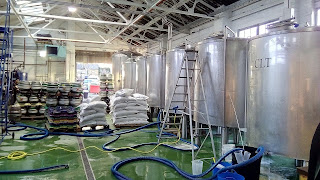The lone survivor is the Sour Cherry & Chocolate variant (left). It's delicious – almost a dry stout and full of roastiness, yet also with lots of dark cocoa notes and a faint underlying sweetness. None of us could detect more than a vague hint of sour cherries though! If you'd like to try it, it should still be on sale from the brewery this coming weekend, either for takeaways or when the bar's open on Sunday lunchtime ahead of the rugby.
The small batch series was in addition to Twickenham's four regular ales, four seasonals, twelve monthly cask specials – Stuart noted that the latter sell out every time, often on the day they're released – and its sole keg beer, Tusk IPA. Steve said they will brew the stouts again this year, probably keeping two of the flavours and asking their customers to suggest two new ones, just as they did last year. They're also looking at doing extra monthly specials to meet demand, and at brewing more strong beers, mainly for bottling and in 330ml bottles rather than the 500s they currently use.
This ties in with the team's desire to update Twickenham's profile within the beer market. The problem is that while it was in the microbrewery vanguard 10 years ago – if I remember rightly, there was a time in the Noughties when it was the second largest cask ale brewery in London – more recently it has “kind of got left behind,” as Steve put it. So now they are looking at what to do next. As Steve added, “Everything's up for discussion – products, packaging, the lot.”
 |
| Busy! The 50-barrel FV is at the back |
While wet yeast does require extra care and management, and must be renewed from the yeast bank every three months, the fact that the rest of the time they can harvest and re-use it means that it is much cheaper than dried. More importantly to the brewers though, it has improved the beer's clarity and brought out the flavours of the ingredients. “Our beers were clear before, but they shine now,” enthused Dave, Stuart's deputy. I think he's right.
Stuart also discussed several other ingredient changes. Interestingly, when it's just had its 50th anniversary, they've stopped using Maris Otter barley and switched to the increasingly popular Flagon variety which he says gives better extract levels (i.e. more fermentable sugars). Some of the beer recipes have been tweaked too, and they've changed some of the hop varieties. In particular, they're making quite a bit of use of Progress and Pioneer hops – I especially liked the subtle bitter-orange and peach notes they gave to our other special treat, which was a saved-up cask of Winter Warmer, their monthly special for December.
 |
| Sadly the Hill 60 and Oud Bruin are long gone |
It was really good to see the brewery busy and taste the beers again, and I do hope they can boost their market image – not least so that I get the chance to buy their beers more often, especially the monthlies and one-offs. (Yes, given the nature of the visit yesterday's tastings were complimentary, but most of the time I do buy my own beer!)

Changing the yeast,malt and some of the hops.Then tweaking the recipes.They cant be the same beers.Only the water has stayed the same.What next a name change.Oh I have seen they have done that already with Hornet and Strong and Dark.Did no-one at Camra mention this to the owner?
ReplyDeleteAs Tom says, things change all the time. Usually they're small things to keep the beer consistent - a particular hop's not available this year, so you use another, or this year's barley crop is a bit different so you adjust the mash schedule. Other times they're to track changes in public taste - make a beer a little hoppier or a little sweeter, say - or simply to improve quality. Most of the time, especially with beers made once a year, my experience is that people (even beer geeks) don't really notice until it's pointed out to them.
DeleteWhat an unusual comment jocko. Things change all the time. Are you saying things have changed for the worse? The TFA beers I had the last time I was in Twickenham were very good.
ReplyDelete